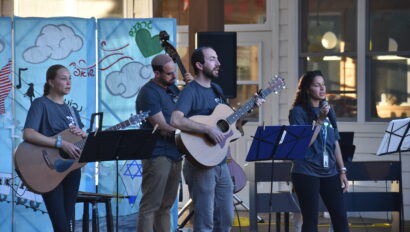Taking Responsibility by Holding Others’ Silence
by Shalom Orzach
The Torah portion Sh’mini presents what must be one of the most tragic and theologically challenging events: the death of Aaron’s two sons, Nadav and Avihu, who are instantly consumed by fire for offering a “strange fire” that was not commanded. The outrage is only intensified by the irony and denotation of their names. Nadav evokes “lehitnadev,” meaning “to volunteer,” and Avihu, he, Aharon (or perhaps God?) is my Father. Both suggest remarkable qualities and yet their lives are cut short in a frenzied if not callous manner. Counterintuitively, in a confounding response upon receiving the terrible news of their death from his brother Moses, Aaron is silent and struck dumb — “Vayidom Aharon” (Leviticus 10:3).

This enigmatic episode has caused much ink and many tears to be spilled. But why is the Torah silent? More crucially, why is Aaron? Is his silence an expression of apathy? Or is his silence — like other qualities of this lover and pursuer of peace — something we should aspire to emulate?
The only time that the term vayidom appears in the Torah is in this story. What is the origin of this unrivaled word?
At the climax of the poignant Unetaneh Tokef prayer of the Rosh Hashanah and Yom Kippur liturgy, in a verse that echoes God’s revelation to the prophet Elijah, we are told that a great horn will be sounded but “a still, small voice” — a “kol demama daka,” literally a thin, silent voice — shall be heard. How are we to understand the incongruous phrase “silent voice”? What is this sound of silence?
Perhaps Aaron’s most intimate yet public show of grief exemplifies that there are sounds that defy speech, sounds that are higher than speech. As we are taught in Ecclesiastes, “there is a time for silence and a time for speech” (3:7).
In modern Hebrew, the military command “Attention!” — “amod dom,” literally “stand still” — invokes this allusion: soldiers stand in silence whilst being highly attuned. How astonishing if not fitting it is that during the customary siren on Yom Hashoah (Holocaust Memorial Day) and Yom Hazikaron (Israel’s Memorial Day for Fallen Soldiers), we adopt Aaron’s reaction: we stand silently, omdim dom.
Aaron’s silence was not a silence of apathy. This lover and pursuer of peace, who could not abide conflict and strife, would have cried out against such silence. Rather, Aaron’s silence was an active and forceful expression of awe and reverence. Aaron shows us that sometimes the silence of awe is not a non-reaction but perhaps the only reaction. His silence also provides an example for us when working to embody support for others – kol yisrael areivin zeh bazeh: sometimes we need to hold others in their silence (or be held in ours), and sometimes our silence may be appropriate, even powerful, as we stand by others. However powerful our words are, their absence can provide even more impact.
As we desperately seek solace in these agonizing times, gathering in our schools and community centers, in our synagogues, summer camp and in the salons of our homes — let the moments of silence inform the moments of speech. Let our reflections enlighten and brighten our futures. And let the outcries of our Biblical and prophetic leaders, as well as Aaron’s silence, not only inform our reactions but also mobilize us to the necessary action. A commitment to act, to do, to help, to tell and share our story and to find comfort in our being Ramah Wisconsin, a community that holds and embraces all of the members of our extended and compassionate family.
Shalom Orzach is a senior educator and consultant for the iCenter and serves on faculty for the Foundation for Jewish Camp. He is an acclaimed public speaker on contemporary Israel who brings extensive knowledge, humor and passion. He has published articles on Israel and Jewish education in The Times of Israel and eJewishPhilanthropy. His ELI talk can be accessed here. He can been found blowing bubbles during the summer in the Northwoods at Camp Ramah in Wisconsin where he relishes the chance to teach and enhance Israel education.





